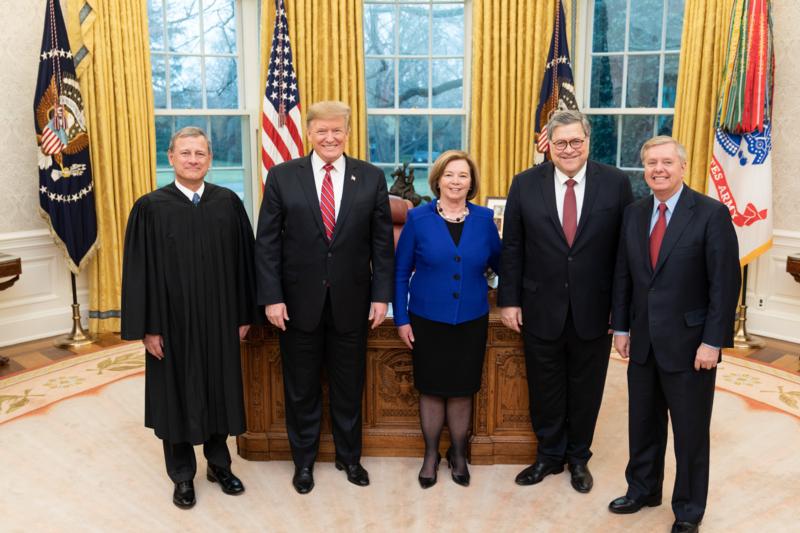Is There a Perjury Case Against Barr?
On May 2, Speaker of the House Nancy Pelosi made an accusation: Attorney General William Barr, she said, had lied to Congress. And the speaker emphasized: “That’s a crime.”

Published by The Lawfare Institute
in Cooperation With

On May 2, Speaker of the House Nancy Pelosi made an accusation: Attorney General William Barr, she said, had lied to Congress. And the speaker emphasized: “That’s a crime.”
Pelosi’s comments referred not to Barr’s testimony the previous day before the Senate Committee on the Judiciary but, rather, to his comments during a previous appearance in front of the House appropriations committee on April 9, after Barr released his letter characterizing Special Counsel Robert Mueller’s conclusions but before the release of Mueller’s report itself. Pelosi’s accusation is serious, and it adds fuel to the fire stoked by congressional Democrats demanding that Barr step down.
There’s just one problem: The legal standard for perjury is a high one, and it’s highly unlikely that the attorney general’s comments clear that bar.
At a closed-door meeting earlier in the day, Politico reported, Pelosi specifically noted that the “crime” had taken place during the following exchange between Barr and and Rep. Charlie Crist during the appropriations committee hearing:
Crist: Reports have emerged recently, general, that members of the special counsel’s team are frustrated at some level with the limited information included in your March 24 letter—that it does not adequately or accurately necessarily portray the report’s findings. Do you know what they’re referencing with that?
Barr: No, I don’t. I think, I think, I suspect that they probably wanted, you know, more put out. But in my view, I was not interested in putting out summaries or trying to summarize, because I think any summary regardless of who prepares it not only runs the risk of, you know, being under-inclusive or over-inclusive but also, you know, would trigger a lot of discussion and analysis that really should await everything coming out at once.
Honest questions deserve honest answers. I'm very concerned that Attorney General Barr's answer on April 9, 2019 wasn't honest.
— Charlie Crist (@CharlieCrist) May 1, 2019
If that's true, there will be consequences. pic.twitter.com/CP9JHeKvqt
Crist’s question concerned a New York Times story from April 3, noting that some on the special counsel’s team were frustrated with Barr’s characterization of their work in his March 24 letter to Congress. The morning of May 1, hours before Barr was set to testify before the Senate judiciary committee, the Justice Department made public a letter that Mueller had written on March 27, a week before Barr’s testimony to Crist. Mueller's letter stated: “The summary letter the Department sent to Congress and released to the public late in the afternoon of March 24 did not fully capture the context, nature, and substance of this Office’s work and conclusions. We communicated that concern to the Department on the morning of March 25.” This is what Pelosi had in mind when she argued that Barr had violated the criminal law in his answer to Crist.
Way back in March 2017, Helen Klein Murillo provided Lawfare readers with a primer on the law of lying. As Murillo wrote:
Perjury, criminalized at 18 U.S.C. § 1621, is perhaps the most recognizable law against lying. The statute makes it a crime to “willfully and contrary to [an] oath state[] or subscribe[] any material matter which he does not believe to be true.” It likewise criminalizes doing so in a written statement made under penalty of perjury, and it applies to statements made in federal court or other proceedings under oath, including congressional hearings.
Perjury is extremely difficult to prove. A prosecutor has to show not only that there was a material misstatement of fact, but also that it was done so willfully—that the person knew it was false when they said it. In Bronston v. United States, a unanimous Supreme Court held that a literally true but unresponsive answer could not form the basis of a perjury conviction even if the individual intended to mislead. In that case, a bankruptcy proceeding, the testimony went as follows:
Q: Do you have any bank accounts in Swiss banks, Mr. Bronston?
A: No, sir.
Q: Have you ever?
A. The company had an account there for about six months, in Zurich.
The questioning clearly implied personal bank accounts, but Mr. Bronston answered in regards to his company, implying that he personally never had Swiss bank accounts. It turns out Bronston had a personal bank account with a Swiss bank for a span of about five years. The government prosecuted him for perjury; a jury convicted, finding that his responses were intentionally misleading.
The Supreme Court overturned the conviction and explained the extremely stringent standards for perjury. Although the Court agreed that there was an implication in the second answer that Bronston never had personal bank accounts in Swiss banks, implied material falsity was insufficient. The Court wrote that while “in casual conversation this interpretation might reasonably be drawn,” perjury does “not deal[] with casual conversation and the statute does not make it a criminal act for a witness to willfully state any material matter that implies any material matter that he does not believe to be true.”
The Court made clear that the burden is on the questioner: “Under the pressures and tension of interrogation, it is not uncommon for the most earnest witnesses to give answers that are not entirely responsive. Sometimes the witness does not understand the question, or may in an excess of caution or apprehension read too much or too little into it .... It is the responsibility of the [questioner] to probe; testimonial interrogation, and cross-examination in particular, is a probing, prying, pressing form of inquiry.”
Further, it didn’t matter that the jury in Bronston found as a matter of fact that the witness’s response was intentionally misleading because a “jury should not be permitted to engage in conjecture whether an unresponsive answer, true and complete on its face, was intended to mislead or divert the examiner.”
Barr’s comments to Crist were certainly misleading. Under Bronston, however, it’s hard to see how they constitute perjury. Crist didn’t ask whether Barr had heard from Mueller or members of Mueller’s team, or whether he knew whether Mueller personally was upset. In response to questioning from Sen. Dick Durbin during the May 1 hearing, Barr explained:
Durbin: I cannot imagine that you received that letter on March 24 and could not answer Congressman Crist directly when he asked you whether there were concerns about representations being made on these findings by the people working for Bob Mueller. You said no, I don't know, after you received this letter. What am I missing?
Barr: Well, as I explained to—as I explained to Senator Leahy, I talked directly to Bob, and Bob told me that he did not have objections to the accuracy— (Emphasis added.)
Barr’s response suggests his defense: He understood Crist to be asking if he knew anything about concerns raised by members of Mueller’s team, not by Mueller himself. And Barr had only heard directly from Mueller.
The attorney general’s comment later in the May 1 hearing that he thought the Mueller letter “was probably written by one of his staff people” complicates the explanation he provided to Durbin. But he could also argue that he understood Crist’s question about “what they’re referencing” to refer to the sources behind the media reports, or what specifically those unknown sources had told reporters—rather than the concerns of Mueller and his team.
As Murillo wrote, perjury is not the only offense in the criminal code that could apply to lies before Congress. There’s also the general false statements statute, 18 U.S.C. § 1001. But it’s far from clear that Barr’s statements meet that standard either:
By far the broadest federal statute criminalizing lying is 18 U.S.C. § 1001, which makes it a crime to “knowingly and willfully ... make[] any materially false, fictitious, or fraudulent statement or representation” in the course of “any matter within the jurisdiction of the executive, legislative, or judicial branch” of the federal government. There’s no requirement that the statement be under oath.
…
In 1996, § 1001 was revised to explicitly apply to “any matter within the jurisdiction of the executive, legislative, or judicial branch.”
The statement must be “material” but materiality means only that the statement is “predictably capable of affecting ... [an] official decision.” This same definition of materiality applies to perjury. In United States v. Gaudin, the Supreme Court held that the issue of materiality is to be determined by juries.
In its present form, § 1001 sweeps incredibly broadly: just about any material statement to an official of any branch of the federal government on a matter they are investigating.
Again, given the ambiguity of Crist’s question, it’s hard to say that Barr “knowingly and wilfully” made false statements before Congress.
None of this is to exonerate Barr. His testimony was deeply misleading. It was, as Sen. Sheldon Whitehouse commented on May 1, “masterful hairsplitting.” It was unbefitting the office of the attorney general. It just probably wasn’t criminal.



.jpg?sfvrsn=90a0cdc0_3)

